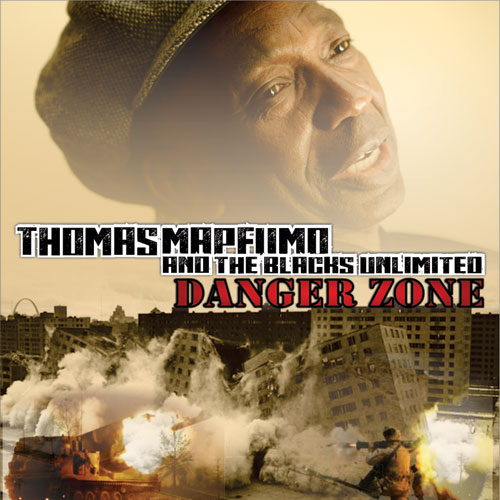It’s been five years since the Lion of Zimbabwe—still in exile in Oregon—has released an album of new songs. During most of his four-decade-plus career there was at least one new album every year. The slower pace is hardly a sign of slowing creative output; the maestro continues to write new songs constantly and rehearse them with his core band. Rather, it has more to do with the financial and logistical challenges of exile, and the difficulty of being so long removed from the audience that loves him most and that once supported him by faithfully attending his frequent, epic concert performances in Zimbabwe.
Danger Zone is a varied collection of songs that in many ways reflects Mapfumo’s new reality as a spokesman for Zimbabweans in diaspora. As fans would expect, Mapfumo hits on politics in the album’s deep, slow reggae title track, but here the perspective is global as Mapfumo bemoans the warring state of the world. Songs that address Zimbabwe in particular include “Chikwereti (Credit),” a warning that gifts from donor nations such as China are not really gifts; reciprocation is expected. The message is a throwback to Mapfumo’s famous refrain from the 1989 song “Corruption,” where he sang “something for something, nothing for nothing.” Only now, the context is global rather than local. The crucial statement here on Zimbabwe’s politics come in a brooding Afro-funk number called “Hatidi Politics (We Don’t Want Politics).” It’s essentially a plea for his countrymen to quit putting their hopes any politicians whose interests are not shared by the common people. The implication is that Zimbabweans will have to solve their own problems; no politician or party will do that for them—a discouraging outlook indeed as the country’s economy sinks into yet another devastating trough.
Elsewhere, somewhat incongruously, we get feel-good songs of a sort Mapfumo hasn’t turned out in many years. “Are You Ready” and “Music” boost the power of music to deliver happiness, and “Celebrate” cheerfully embraces the notion of enjoying good times. These songs likely stem from an urge on Mapfumo’s part to show that he’s not simply a stern old critic of everything that’s gone wrong in his country and the world. However Zimbabweans suffering under the privations of the Mugabe dictatorship could be forgiven for taking these songs as a sign that the “chimurenga guru” has grown rather comfortable living in America.
Then there’s “Zimbabwe,” a heartfelt anthem of hope and solidarity with people back home as they face the task of rebuilding all that Mugabe’s regime has destroyed and squandered. “Nhamo Urombo (Problems of the Poor)” picks up one of the most prominent themes in Mapfumo’s vast canon of songs—his sympathy with and understanding of those who must face this task owning nothing. For the poor, there is little else to discuss other than the challenges and deprivations of indigence.
When it comes to the music itself, there are some new twists here. “Nhamo Urombo” has the pep and vigor of a classic folksy jit number, but here and on a few other tracks, Mapfumo experiments with Auto-Tuned vocals. It kind of works on this track, but old time fans may take awhile to adjust to the idea. Two tracks here were created with Los Angeles-based DJ Charlie B. Wilder, and aim for a club-friendly electronic sheen that might bring in listeners too young to remember the hits of the liberation struggle, or the glories of the Blacks Unlimited in post-independence Zimbabwe. The first of these, “Music,” has an appealing momentum to it, but one wishes its English lyrics had more to say than simply that music is great. More successful is a remake of the 1989 song “Shebeen,” with a soulful guest vocal from Natalia “Moxie” Rollins—a great song reinvented with style.
The most musically satisfying tracks here, including “Chikonzero (The Reason Why),” “Chikwereti” and “Nhamo Urombo,” come through with the richness of classic Blacks Unlimited dance tracks. The refrains are catchy, the lead vocals powerful and enriched with layers of backing harmonies, the grooves deep and trenchant, and the guitar and brass work ever sharp and snappy. There are two lovely mbira-based songs that echo one of the most enduringly seductive aspects of the Mapfumo repertoire. “Pasi Idandaro (We Are Just Passers-by) has an intimate, acoustic feel, while “Varimudande (People of Dande) brings the roiling gravitas of Blacks Unlimited trance songs, the sort that used to animate crowds in Harare deep into the wee hours. Both these tracks are mixed with excessive reverb and lack the clarity and presence of the best Mapfumo mbira tracks, but it’s always gratifying to hear the band in this mode.
In all, Danger Zone presents a complicated mix of impulses and lacks a certain coherence. The band is terrific, and the man certainly has plenty to say, and evident passion. But at this stage in his career, one wishes that Mapfumo could work with a well-heeled producer and create an album with a more unified and well-honed sound and clearer focus. On the other hand, given all the man has done and endured, we are lucky to have him in the creative arena at all, working hard to please an increasingly divergent and far-flung constituency.
Chimurenga Music








